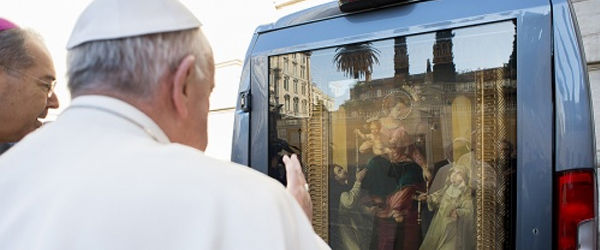Sister Patty Chappell — who had been on the job as executive director of Pax Christi USA (PCUSA) for just a year — was walking between tables in the meeting room at St. Camillus Center for Spiritual Care around noon on Nov. 18. The Sister of Notre Dame de Namur was making points not only with inflections of her Southern down-home voice, but also with her waving arms and hands. The former social worker and president of the National Black Sisters’ Conference was talking about what a difficult transition year it had been — not only moving the national office from Erie, Pa., to Washington, D.C., but also the loss of key personnel in that move along with a drastic drop in donations. “But, you know, my brothers and sisters, I honestly feel that we are in a new Pentecost,” she said and repeated it. “I do believe that we are in a new Pentecost.”A muted “Amen” came from some of the mostly white folks at the tables.“Because we see new energy, you know, we see us being energized,” she went on, raising her voice. “And we see this Catholic peace movement being more critical now than ever. Would you all agree with that?”There was a chorus of “yeahs.”“And you have got to keep on keeping on. But we also have to find a way to bring new blood and new generation into this movement. Because — no disrespect, and I have gray hair, too — but when I look around, most of us in this room, it’s like who’s going to carry the torch? You know, we have the wisdom, but we also need new blood to keep it moving.”Then, almost on cue, five students from Bishop Alemany High School in Mission Hills came through the door of the center, whose trained chaplains serve the nearby L.A. County-USC Medical Center Health Care Network complex. People applauded and Sister Chappell’s lean face broke into a big smile. “Hi, welcome you all. How you doing?” she said, before turning back to the tables. “Talk about new blood. It’s a blessing to know that we’ve got some young folks who are on this battlefield.” Facing the students again, her voice softened. “So I thank you personally from the national office.”Latin for “Peace of Christ,” Pax Christi was started in France after World War II as a reconciliation between French and German Catholics who had fought and killed each other. By the 1950s, the peace movement had already spread to Italy, Spain, the Netherlands, Austria, Switzerland and Belgium. And in 1972, a small group of mostly lay Catholics started it in the United States. Today, there are 20 regions with nearly 400 local chapters in the U.S. Members include religious congregations, parishes, local and campus groups, and individual Catholics, even bishops. The purpose of Pax Christi has always been to witness to the Christian call of nonviolence through both reflection and action to transform unjust and destructive structures of society. PCUSA “rejects war, preparation for war, and every form of violence and domination. It advocates primacy of conscience, economic and social justice and respect for creation.” Grassroots actions can range from holding a prayer vigil outside a prison where a death sentence is being carried out to hosting a parish program against the deportation of immigrants. Or joining a coalition for affordable housing and publishing educational resources about the destruction of the environment. Or conducting an anti-racism workshop.Racism in Pax Christi USA’s own ranks came up, in fact, at Pax Christi USA leadership team’s four-hour session at St. Camillus, followed by a Mass in the adjoining chapel. Sister Chappell stressed that the organization had struggled with its “white image” for years.“And that continues to be a real issue for Pax Christi — How do we become an anti-racist, multicultural Catholic peace movement?” she asked. We want all of us to understand that unless we have the witness of people of color as a vital part of PCUSA, then we cannot claim to be prophetic. We have to have Catholic voices of color at the table helping to shape and make decisions about the movement.“So we need your help. What are some of the ideas that you all are trying to do in your chapters to invite people of color? And my challenge is also to those of us who are people of color in this room. We also have a responsibility to reach out to our folks and to help them understand why it is critical to be a part of this Catholic peace movement. “We are all Catholics,” Sister Chappell finally pointed out. “We all belong to the family of God.”To learn more about Pax Christi SoCal and Pax Christi USA, go to, respectively, paxchristisocal.org and paxchristiusa.org. {gallery width=100 height=100}gallery/2012/1214/paxchristi/{/gallery}

